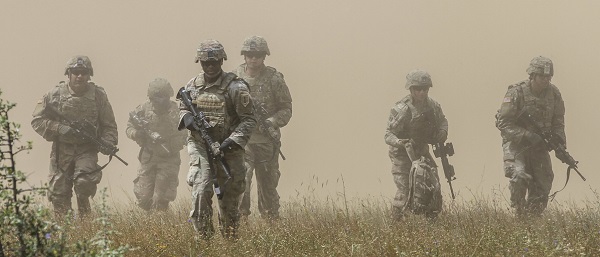International
ABC airs pro-life ad showing aborted babies during The View, comparing hosts to Nazis

From LifeSiteNews
‘These are dead human beings, murdered by abortion that you promote,’ said presidential candidate Randall Terry in a pro-life ad with images of aborted babies that ABC was forced by law to air during The View.
A pro-life ad that aired during ABC’s popular daytime talk show The View highlighting that aborted “fetuses” are actually murdered children has infuriated the broadcast world, including the show’s co-hosts, whom the ad compared to Nazis because of their pro-abortion views.
The 30-second commercial spot from the Randall Terry presidential campaign took aim at “stupid celebrities” and “lying journalists” who use their platforms to promote abortion.
“I am so sick of stupid celebrities and lying journalists,” begins a voiceover by Terry, as photos of all six regular The View hosts are shown.
The faces of other pro-abortion Hollywood celebrities and news media personalities are then flashed across the screen, including Oprah Winfrey and Robert De Niro.
“Why don’t you fools follow the science?” asks Terry, as images of a newborn baby, a child in the womb, and then a series of gruesome photos of violently aborted children are shown in quick succession.
“These are dead human beings, murdered by abortion that you promote. If history even remembers you, you’ll be remembered like Leni Riefenstahl and Joseph Goebbels,” predicts Terry, as portraits of the two prominent World War II-era Nazis are shown.
According to Entertainment Weekly, before showing the ad ABC posted a message saying, “The following is a paid political advertisement, and the ABC Television Network is required to carry it by federal law. The advertisement contains scenes that may be disturbing to children. Viewer discretion is advised.”
After the ad concluded, ABC posted a second message, to apologize for what their audience had just seen: “The preceding was a paid political advertisement that the ABC Television Network was required to carry under federal law. The advertisement contained scenes that may be disturbing to viewers.”
“Broadcast stations are prohibited from censoring or rejecting political ads that are paid for and sponsored by legally qualified candidates,” according to the Federal Communications Commission (FCC). Randall Terry is on the ballot in 12 states, legally qualifying him as a national candidate.
CNN took offense at some of its virulently pro-abortion personalities being targeted in the commercial.
“The ad in which presidential candidate Randall Terry — without merit or explanation — compares multiple respected CNN journalists and commentators to Nazis is outrageous, antisemitic, and dangerous,” the network claimed in a statement to Entertainment Weekly.
LifeSiteNews reported previously that Terry’s campaign has developed more than two dozen TV ads custom-tailored to each state where Democrats are seeking to have abortion declared a legal “right” through November ballot initiatives.
Having judged past pro-life efforts since the Supreme Court overturned Roe v. Wade to be “anemic,” allowing catastrophic pro-life losses in Ohio, Michigan, Kansas, and Kentucky, the Terry campaign has incorporated images of aborted babies into its messaging in order to help religious voters understand that abortion is exactly what Pope St. John Paul II called it: “Murder.”
“You cannot end a holocaust of this magnitude without showing the victims and calling it ‘Murder,’” Terry told LifeSiteNews, explaining his rationale for including images of aborted children.
“There are rules and tools in social warfare, and if those five rules and tools are not used, you lose: incendiary images, radical rhetoric, aggressive action, serious sacrifice, and verifiable victory,” Terry said as he explained the need to change the tactics employed in defeating pro-abortion policies and politicians.
“With those tactics you win, without them, you lose,” he reiterated.
“The pro-life movement establishment does not want to be controversial,” Terry said. “Can you imagine saying, ‘We’re going to fight against antisemitism but not show pictures of the Jews in the holocaust?’ — or —‘We’re going to fight racism, but we’re not going to show the black men hanged by the Ku Klux Klan, or Emmett Till’s body, or ‘the water cannons and the dogs’ because they’re just too harsh?”
“That would be absurd,” Terry said. “So, we have to show the babies, and we have to call it what God calls it, which is what St. Pope John Paul II called it: ‘Murder.’ He called abortion ‘murder’ eight times in the The Gospel of Life.”
Crime
Hero bystander disarms shooter in Australian terror attack

Insane footage shows a bystander attacking and disarming one of the terrorists, who appears to have been armed with a long rifle, during today’s shooting attack on an event celebrating Hanukkah at Bondi Beach in Sydney, Australia. pic.twitter.com/mJceco22bJ
— OSINTdefender (@sentdefender) December 14, 2025
The chaos that struck Australia on Sunday night produced one moment of astonishing courage: a Sydney shopkeeper, armed with nothing but instinct and grit, charged a gunman at Bondi Beach and wrestled the rifle out of his hands as terrified families ran for cover. Authorities say the act likely prevented even more deaths in what officials have already called an antisemitic terror attack that left 12 people dead and dozens wounded during a Hanukkah celebration along the water.
The hero has been identified as 43-year-old fruit shop owner Ahmed Al Ahmed, a father of two who happened to be nearby when gunfire erupted at the beachfront event “Hanukkah by the Sea,” which had drawn more than 200 people. Footage captured the moment he marched toward the shooter, grabbed hold of the rifle, and overpowered him in a brief, violent struggle. As the gunman hit the pavement, Al Ahmed momentarily pointed the weapon back at him but didn’t fire, instead placing it against a tree before another attacker opened up from a bridge above. He was hit in the hand and shoulder and is now recovering after emergency surgery.
A relative told Australia’s Channel Seven that Al Ahmed had never handled a gun in his life. “He’s a hero — he’s 100 percent a hero,” the family member said. New South Wales Premier Chris Minns echoed the praise, calling the scene “unbelievable,” adding, “A man walked up to someone who had just fired on the community and single-handedly disarmed him. Many people are alive tonight because of his bravery.”
Police say two shooters stepped out of a vehicle along Campbell Parade around 6:40 p.m. and began firing toward the beach. One gunman was killed, the other is in custody in critical condition. Detectives are also investigating whether a third attacker was involved, and bomb units swept the area after reports that an explosive device may have been planted beneath a pedestrian bridge. The toll is staggering: 12 dead, including one shooter, and at least 29 wounded — among them children and two police officers.
Prime Minister Anthony Albanese condemned what he called “a targeted attack on Jewish Australians on the first day of Hanukkah,” saying, “What should have been a night of joy and peace has been shattered by this horrifying evil attack.” Emergency crews flooded the beach as hundreds of panicked people sprinted away from the gunfire. Video shows one attacker firing down toward the sand from the bridge behind Bondi Park before being shot himself in a final standoff captured by drone footage. Both gunmen appeared to be carrying ammunition belts, with witnesses estimating up to 50 rounds were fired.
Australian police have cordoned off properties linked to the suspects and continue to canvass Bondi for additional threats. What remains clear is that Sunday’s attack was met with extraordinary acts of self-sacrifice, none more dramatic than a shopkeeper from Sutherland who walked into gunfire to stop further slaughter.
Crime
Terror in Australia: 12 killed after gunmen open fire on Hanukkah celebration

One of the suspected gunmen of the Bondi Beach massacre shooting in Australia has been identified as Naveed Akram
What was supposed to be a peaceful Sunday evening celebration of Hanukkah on one of the world’s most famous beaches instead descended into chaos and bloodshed, as two attackers opened fire on crowds gathered at Sydney’s Bondi Beach, killing 12 people — including one of the gunmen — and injuring at least 11 others.
The violence erupted shortly after 5 p.m. local time, just as more than a thousand people were gathering for “Hanukkah by the Sea,” an annual event held near a playground at the Bondi foreshore. According to Australian outlets, the shooting began as families were lighting candles and singing, sending parents scrambling to shield children and worshippers diving for cover along the promenade.
New South Wales Premier Chris Minns confirmed late Sunday that one attacker was killed at the scene and a second was arrested. He said the evidence already points unmistakably toward an anti-Jewish terror attack. “What should have been a night of peace and joy was shattered by a horrifying, evil attack,” Minns told reporters, noting investigators believe the plot was “designed to target Sydney’s Jewish community.”
NSW Police Commissioner Mal Lanyon said well over a thousand people were present when the shooting started, including two state police officers who were among those struck by gunfire, according to ABC News. Police also located what appeared to be an improvised explosive device in the vicinity shortly after the initial gunfire. Bomb technicians neutralized the device while officers locked down the area and urged residents to shelter in place.
Around 9 p.m., with ambulances and tactical units pouring in, authorities described the unfolding chaos as a “developing incident” and warned anyone nearby to stay indoors. Multiple victims were treated on the sand and the surrounding walkways before being rushed to hospitals across Sydney.
As investigators piece together the attackers’ movements and motive, officials say the toll could have been even worse given the size of the crowd and the presence of children throughout the event. What remains is a shaken city, a grieving Jewish community, and a country once again confronting the threat of political and religious extremism on its own soil.
-

 Crime18 hours ago
Crime18 hours agoTerror in Australia: 12 killed after gunmen open fire on Hanukkah celebration
-

 Crime18 hours ago
Crime18 hours agoHero bystander disarms shooter in Australian terror attack
-

 Business1 day ago
Business1 day agoInflation Reduction Act, Green New Deal Causing America’s Energy Crisis
-

 Business1 day ago
Business1 day agoFuelled by federalism—America’s economically freest states come out on top
-

 Daily Caller1 day ago
Daily Caller1 day ago‘There Will Be Very Serious Retaliation’: Two American Servicemen, Interpreter Killed In Syrian Attack
-

 illegal immigration2 days ago
illegal immigration2 days agoUS Notes 2.5 million illegals out and counting
-

 Automotive1 day ago
Automotive1 day agoPoliticians should be honest about environmental pros and cons of electric vehicles
-

 Alberta2 days ago
Alberta2 days agoThe Recall Trap: 21 Alberta MLA’s face recall petitions



